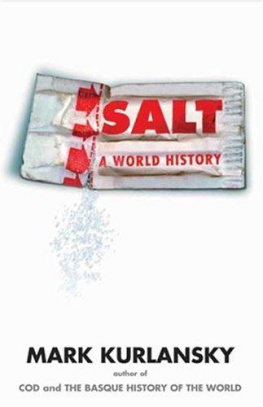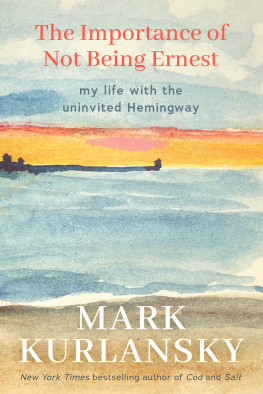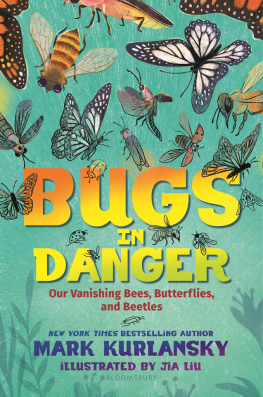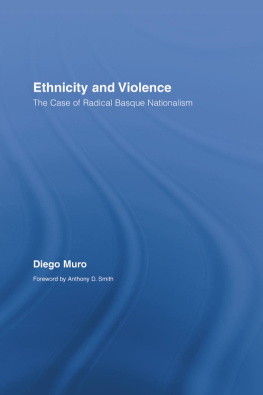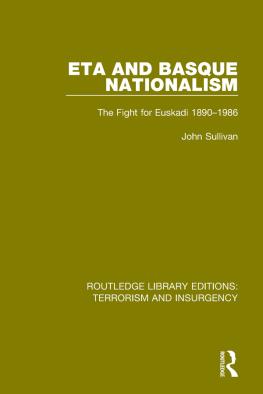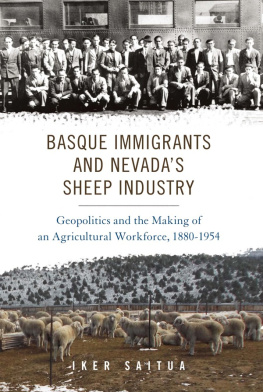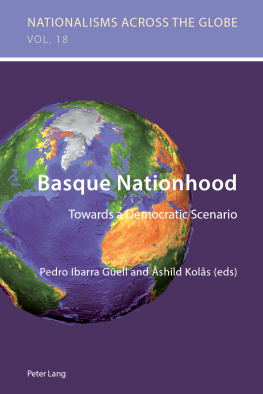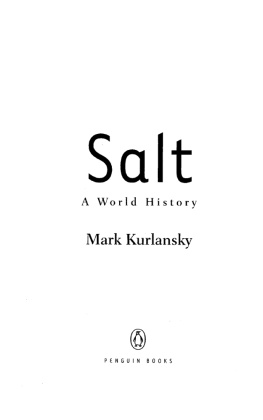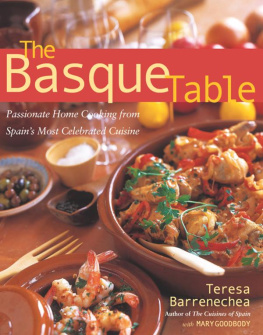The
BASQUE
HISTORY of
the WORLD
Mark Kurlansky

To Marian,
who makes life sparkle
Contents
Part One
THE SURVIVAL OF EUSKAL HERRIA
Part Two
THE DAWN OF EUSKADI
Part Three
EUSKADI ASKATUTA
The Basques are one of the unique people-islands to be found on the face of the earth, completely different in every sense from the peoples around them, and their language, surrounded by Aryan languages, forms an island somehow comparable to those peaks which still surface above the water in a flood zone.
Lewy DAbartiague, ON THE ORIGIN OF BASQUES, 1896
(A study made at the request of the
London Geographic Congress of 1895)
These Basques are swell people, Bill said.
Ernest Hemingway, THE SUN ALSO RISES, 1926
THE FIRST TIME I heard the secret tongue, the ancient and forbidden language of the Basques, was in the Hotel Eskualduna in St.-Jean-de-Luz. It was the early 1970s, and Franco still ruled Spain like a 1930s dictator. I was interested in the Basques because I was a journalist and they were the only story, the only Spaniards visibly resisting Franco. But if they still spoke their language, they didnt do it in front of me in Spanish Basqueland, where a few phrases of Basque could lead to an arrest. In the French part of Basqueland, in St.-Jean-de-Luz, people spoke Basque only in private, or whispered it, as though, only a few miles from the border, they feared it would be heard on the other side.
Much of St.-Jean-de-Luz, but especially the Hotel Eskualduna, seemed to function as a safe house for Basques from the other side. Spanish was almost as commonly heard as French. But at the little caf on the ground floor of my hotel, the elderly hotel owner and her aging daughter whispered in Basque. When I walked into the room, they would smile pleasantly, offer me a suggestion for a restaurant or a scenic walk, and then resume talking in full voice in Spanish or French. As I opened the big glass-and-iron door to the street, I could hear them once again whispering in Basque.
The first time I went to St.-Jean-de-Luz, I arrived by train and was carrying heavy bags. I chose the Eskualduna because it was close to the train station. It was also inexpensive and housed in a fine, historic, stone building with a Basque flag over the doorway and antique wooden Basque furniture inside. I kept returning there because it seemed that something interesting was going on, though I never found out what. For that matter, it was years before I realized that the hotel had been a center for the Resistance during World War II and that my helpful, smiling hosts were decorated heroes who had been the bravest of people at one of mankinds worst moments.
Everything seemed a little exciting and mysterious in Basqueland. With so much painful and dramatic history surrounding these people, I could never be sure who anyone was, and many Basques told astonishing stories about their experiences during the Spanish Civil War, World War II, and the Franco dictatorship. The silhouette of a long high mountain crest rises up behind St.-Jean-de-Luz where the sun sets, and this mountain, looking too rough to be French, is in Spain. I wrote in my notebook that the mountain, this Spanish border, looked like a vaguely dangerous mystery.
I dont feel that way about Spain anymore. I now know that mountain as a benign nature preserve in Navarra near the border. And I have come to realize that the Basque survival in France is, in its way, as impressive an accomplishment as Basque survival in Spain.
In 1975, I stood in the Plaza de Oriente to hear Francos last speech. I witnessed the transition after his death when freedom and democracy and Western ideals were supposed to be established, and Basque violence was supposed to disappear, because it would be unnecessary and irrelevant. But with Francos men still in powerful positions and no one daring to remove them, the new Spain fell far short of the open democracy so many had hoped for, though it turned out considerably better than the enduring Francoism many had feared.
But the Basques were a surprise. Had I known more about Basque history, I would have expected this, but I had no idea that their language and literature and music and traditions would burst out like a flower after rain. Nor did I realize that neither Spanish democracy nor European integration would pacify the Basque longing.
FEW PEOPLE KNOW the Basques. What they do know is that Basques are tenacious. In Cervantess sixteenth-century Don Quixote de la Mancha, the Basque, the Vizcayan, can barely speak Spanish, has a large sword, and tiresomely insists on fighting. Me kill you or me no Vizcayan, he says.
Four hundred years later, Anas Nin, in her erotic short story cycle, Delta of Venus, created a character simply called the Basque. She wrote, The Basque suddenly opened the door. He bowed and said, You wanted a man and here I am. He threw off his clothes.
Derogatory like Cervantes, laudatory like Hemingway, or a little of each like Nin, in most of literature and films the Basque has always been the same characterpersevering and rugged and not even intimating the rare and complex culture, nor the sophisticated and evolved calculations behind this seemingly primitive determination to preserve the tribe.
The singular remarkable fact about the Basques is that they still exist. In 1896, Lewy DAbartiague observed in his study of their origins:
This people is perhaps the only one in the world, at the least the only one in Europe, whose origin remains absolutely unknown. It is strange to think at the end of the 19th century, which has been so fertile on the subject of origins, that these few people still remain a mystery.
If it was strange a century ago, after Darwin, it seems even more unlikely today with our knowledge of DNA and genetic testing. But the Basques remain a mystery. Even more improbablesomething few except Basques would have predictedis that the mysterious Basques enter the twenty-first century as strong as, in some ways stronger than, they entered the twentieth century. This has been accomplished with more than simple tenacity and unshakable courage, though it has required that as well.
ACCORDING TO A popular Bilbao joke, a Bilbaino walks into a store and asks for a world map of Bilbao. The shop owner unflinchingly answers, Left bank or right?
This is The Basque History of the World because Basques at times think they are the world. They feel inexplicably secure about their place among nations. But more important, Basques, while they are protecting their unique and separate identity, always endeavor to be in the world. No word less describes Basques than the term separatist, a term they refuse to use. If they are an island, it is an island where bridges are constantly being built to the mainland. Considering how small a group the Basques are, they have made remarkable contributions to world history. In the Age of Exploration they were the explorers who connected Europe to North America, South America, Africa, and Asia. At the dawn of capitalism they were among the first capitalists, experimenting with tariff-free international trade and the use of competitive pricing to break monopolies. Early in the industrial revolution they became leading industrialists: shipbuilders, steelmakers, and manufacturers. Today, in the global age, even while clinging to their ancient tribal identity, they are ready for a borderless world.
WHEN CAPITALISM was new and New England traders were beginning to change the world, Boston enjoyed a flourishing trade with Bilbao. John Adams ascribed the prosperity of the Basques to their love of freedom. In 1794, he wrote of the Basques, While their neighbors have long since resigned all their pretensions into the hands of Kings and priests, this extraordinary people have preserved their ancient language, genius, laws, government and manners, without innovation, longer than any other nation of Europe.
Next page


